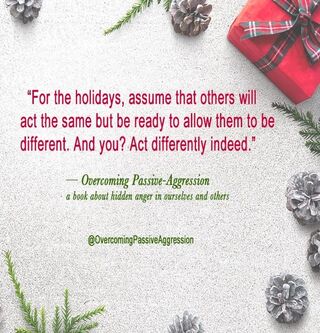Stress
Making Magic and Other Holiday Myths
New habits can make room for personal hallmark moments.
Posted December 11, 2021 Reviewed by Vanessa Lancaster
Key points
- Women's to-do lists can often make six weeks of stress-filled days and evenings.
- The APA reported nearly half of all women have no holiday me-time, feeling fatigued with somatic complaints, low energy, and low sex drive.
- Develop newer, good-enough habits to replace stress-filled, sometimes perfectionistic, and older holiday traditions.
Our parents pictured Norman Rockwell scenes for that ever-so-perfect holiday gathering. Today, we look to the Hallmark Channel, which airs a particular festive formula: Leave the big city for rural Yuletide fun. Add some threat or person standing in the way, or maybe naughtiness that steals nice. Wrap it all up with great scenery, good-looking characters who escape by the fireplace, and the promise of romance.1
The formula has spawned a cottage industry; streaming platforms have jumped onboard marketing holiday flicks. Baltimore Ravens Coach John Harbaugh said, “I’m a Hallmark movie guy. I just like the stories. It makes me feel good about the world.”2

There exist copious benefits from losing oneself in a good book or novel.3 TV and films, too. All increase our dopamine and oxytocin, the feel-good hormones. Escape, it appears, is great for both genders, especially in a season of hassle and hustle. Self-care like this mitigates the risk of seasonal affective syndrome or disorder.4 Yet, it requires the one commodity most women lack: Time.
Women's to-do lists flow off the page in the quest for the most creative cookie exchange, the ugliest Christmas sweater, the best gifts…somewhere, anywhere. There are the fanciest package wrap, boxes, and cards for the post office, decorations to hang and display. No wonder therapists hear all about dread and difficult decisions each December.
Good Enough Rather Than Perfect
Holiday hassles and a quest for perfection put women at particular risk of burnout and poor health, according to a 2006 report from the American Psychological Association (APA). It leaves nearly half of all women in heightened stress feeling that there’s no time to kick back and relax.5 So much for that movie, right?
The six weeks between Thanksgiving and New Year’s gets filled with excess. The APA cited that a third of women turned to food to cope. Nearly 60 percent reported anxiety and/or sadness. Fifty to 60 percent felt fatigued, struggling for energy, while others said muscle tension, indigestion, headaches, and changes in sex drive. These somatic complaints don’t make it into those TV movie teasers.
It’s especially taxing when you’re alone or in transition. Among the holiday hints in Surviving Separation and Divorce, a lifestyle guide for women is the strategy of “acting as if.” If you want to achieve something, act as if you’re already there. This can bypass the striving, the constant quest, and it often allows an easier acceptance of “good enough.”
Opt-out of package wrap and use felt, drawstring bags. Put up fewer decorations and delegate those. Purchase decorative paper plates for parties and set the table with dishes that can go into the dishwasher.
With such choices, you give up being the director and might not be in control, but then too, everyone has ownership, a part in this real-life holiday drama, where each person experiences the holiday spirit. Isn’t that the essence of the Hallmark moment?

No tree needs to be a beast for its complexity and sheer might that it takes to assemble. No china must be hand washed and dried unless you truly love that look at your table. Grandma’s recipe can be made if there’s time, but if not, oh well…she’s there just as much in spirit.
When tempted with perfectionistic thinking, write down your anxious, automatic thought and then a realistic alternative, said the authors of When Perfect Isn’t Good Enough.
Family Frustrations Solved by Flexibility and Calm
A global pandemic forced many families to remain apart, so this year, there’s added pressure to assemble and make it all work, if not like Norman Rockwell, then for Pinterest, Instagram or Facebook.
Enter “gift-wrapped antagonism,” a phenomenon in Overcoming Passive-Aggression whereby people’s frustrations and hidden resentments get externalized to others. The silent treatment. Inappropriate comments or straight-up barbs. Unsuitable gifts that are no accident or innocent mistake. Stall tactics. Using children as pawns in divorce games.
These behaviors or irrational beliefs that go unchecked can spiral a holiday gathering into unhappiness. Think you must invite everyone on the actual holiday itself. The pressures of “should,” “must,” or “ought to” fall into that list of cognitive errors that we can all use to analyze our thinking and help ourselves into better moods, this time of year or at any other.6
Cutting off family isn’t the best solution either. When people must make stressful choices, they may either explode or implode – not good options – or they take a position, openly and honestly stating what they can do and what they cannot. Work together with relatives who desire connection, and who in this extended pandemic, may still battle loneliness.
Rein in your reactivity. When characters don’t behave, strong reactions often escalate matters. Handing back attitude or criticism is an outdated way of not solving problems. Instead, keep your defenses in check, learn to ignore, smile, walk away from the fray. If you must address something, use “I messages,” which avoid “why” questions and “you” sentence starters because both kick in defensiveness.

Criticism, contempt, stonewalling, and defensiveness are what John Gottman calls the Four Horsemen of the Apocalypse, sure to doom any relationship if left unchecked.7 When in doubt, simply be kind…and calm.
Make sure you schedule downtime with a good book, a classic holiday movie, carols, or music on the stereo this holiday season. Unwind in a luxurious bath. Keep up healthy exercise by getting outdoors when you can. Realize that it’s not the picture of Christmas that matters most.
Memories are made simply by being with those around you, to read a story, reminisce, share an experience. Very simply: You do you and allow others to be themselves, making not a movie, but your own moving moments.
Copyright @ 2021 by Loriann Oberlin, MS
References
Books cited: Surviving Separation and Divorce by Loriann Oberlin; When Perfect Isn't Good Enough by Martin Antony, Ph.D. and Richard Swinson, MD; Overcoming Passive Aggression by Tim Murphy, Ph.D. and Loriann Oberlin, MS
Related Blogs: Passive-Aggressive Habits People Avoid and Keeping Holiday Spirits High




